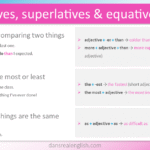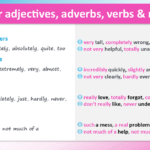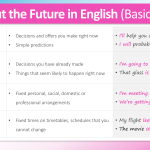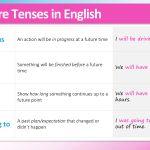Used to + Would for past habits and routines
Talking about past habits is a big part of sharing memories and stories in English, especially when we are talking about childhood.
Two common ways to express repeated past actions are “used to” and “would”.
This free English grammar lesson will show you how to use would and used to to talk about things you did in the past.
“Used to” VS “Would”
WOULD + USED TO for past habits and repeated actions
You can use USED TO and WOULD to describe actions you did regularly in the past but no longer do now. However,
- It’s best to use USED TO when you introduce a topic or habit for the first time:
- Example: I used to play football a lot when I was a child. ✔ (introducing a past repeated action or habit )
- Then, you can use WOULD for other similar actions that come next in your story:
- Example: In those days, we would play football almost every day. ✔ (more details about the past repeated action or habit – background already given)
Example: used to and would together in a natural sentence:
- When I was a child, I used to visit my grandparents in the summer. We would spend all day playing in the garden.
USED TO – for past states
A past state is a situation or condition that stayed the same for some time in the past.
We use state verbs like these to describe states: be, have, know, like, seem, believe, live, own
We usually use USED TO to describe states (not WOULD)
- She used to have long hair. ✔ (“past state “have” with used to)
- She would have long hair. ✘ (we can’t normally use “would” + “have” as a past state)
However, WOULD is sometimes possible of state verbs are used as actions:
- I would often have dinner with my mum ✔ : “Have” in this example is an action meaning “eat” – it is NOT a state!
- I would always know if Kelly was planning to visit ✔ In this example, “Know” really means “become aware” so again, it is not really a state.
- I would often be the first to arrive at our parents’ house ✔ “Be” refers to a temporary action = I would often arrive first (an action, not a state)
Form:
Used to
- Structure: used to + base verb
- Example: I used to live in London. ✔ (past habit or state)
Would
- Structure: would + base verb
- Example: We would visit my cousins every summer. ✔ (past repeated action – background already set)
Key differences
| Used to | Would | |
|---|---|---|
| Past habits | ✔ I used to smoke | ✔ I would often smoke a packet a day |
| Past states | ✔ I used to live in New York | ✘ I would live in New York (this is a 2nd conditional – not a past pattern) |
| First time in a story | ✔ I used to play football a lot when I was young | ✘ (use “used to” to introduce topic, then switch to “would”) |
Used to / would: extra info
- “Used to” becomes “use to” in negatives and questions:
- Did you use to ride a bike?
- I didn’t use to like coffee.
- Pronunciation tip: “used to” is often pronounced /ˈjuːst tuː/ with a soft “d” sound blending into the “t”. In fast speech, it may sound like “yoost to”.
- Avoid using “would” with non-action verbs: Common non-action verbs (also called stative verbs) include “believe”, “own”, “know”, and “understand”. These usually describe mental states or conditions, not actions. Example:
- Incorrect: We would own a car.
- Correct: We used to own a car.
- Incorrect: I would have a dog. X
- Correct: I used to have a dog.
- Emphasis and storytelling: “Would” is often used in storytelling or writing to create rhythm or highlight repeated behavior:
- On summer evenings, Dad would sit on the porch and would tell stories from his youth.
How to pronounce “would” for past actions
Would for past actions often becomes “‘d” in natural speech. Try not to confuse ‘d (= would) with ‘d (=had):
- Would is often contracted in spoken and written English. We usually write ‘d after the subject:
- I would go → I ‘d go
- She would read → She ‘d read
- In fast, natural speech, ‘d is usually very soft and often linked directly to the next word, especially if the next word starts with a vowel sound:
- He ‘d always help us. (sounds like “heed always”)
- Be careful not to confuse ‘d with “had” – only context shows the meaning:
- I ‘d gone (past perfect: had gone)
- I ‘d go (conditional or past habit: would go)
“Used to” and “Would” examples in context
Model dialogue
This conversation shows natural use of “used to” and “would” in context:
- A: So, did you use to live by the sea, then?
- B: Yes, I did. I used to live in Cornwall, actually.
- A: Oh, really? So, what did you use to do there, then? Was there much to do?
- B: Yeah, in fact, we‘d often go surfing. We used to go almost every weekend, actually. I used to love surfing.
- A: I bet you did.
Short diary entry
This diary entry shows how to use past habit structures in writing:
When I was a teenager, I used to spend hours reading in the attic. My grandmother would bring me snacks and we‘d talk about books. I used to dream about becoming a writer.
Used to / would exercises
Exercise 1 – Complete the sentences
Choose the correct form of “used to” or “would” for each sentence. Some allow both depending on meaning.
1. When we were kids, we our bikes around the neighborhood every evening.
2. My grandfather us stories about his childhood.
3. I in Madrid before moving to London.
4. She spicy food, but now she loves it.
5. On summer evenings, we outside and watch the sunset.
6. We go hiking every weekend in July.
Exercise 2 – Correct the mistake
Choose the corrected version of each sentence. Focus on “used to” and “would” forms.
1. He would know all the answers in class.
2. I didn’t used to enjoy swimming.
3. Did she used to work here?
4. They use to have a dog named Max.
5. We would be very shy as children.
Exercise 3 – Choose the right option
Test your understanding of when and how to use “used to” and “would.”
1. I play the piano when I was younger.
2. Which sentence is correct?
3. “Would” is NOT normally used with:







